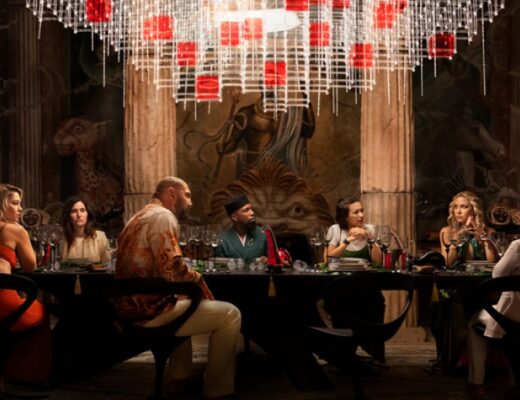Fire of Love is an gorgeous visual document that is somewhat undermined by its inorganic and distracting voiceover work.
Despite boasting a title that seems more suited to a reality dating show about finding love with a hunky firefighter, Fire of Love is actually a documentary about the singular eccentricity of volcanologists, two in particular: husband-wife duo Maurice and Katia Krafft. Thus far in her young career, director Sara Dosa has carved out a niche corner of the film world by telling true stories of distinctive characters — war vets turned mushroom hunters in Oregon, a seer who communes with nature spirits in Iceland — and her portrait here of the Kraffts extends her interests into new terrain. On the surface, Maurice and Katya certainly fit that oddball mold: Katya looks like she emerged straight from Steve Zissou’s crew, sky blue jacket and red stocking cap seemingly her staple look, while the pair chase volcanic activity around the globe at a moment’s notice, offering such exclamations along the way as: “Volcanoes are one of the most beautiful things in nature but they kill.” Too right they do, and part of Fire of Love’s power comes in our knowledge that this pair will indeed meet their death at the hands of one of their beloved natural wonders. It allows Dosa to forgo any kind of organizing narrative principle, instead allowing for a free-flowing, at times amorphous melange of beautiful images and observations.
The Kraffts left behind hundreds of hours of footage and thousands of photographs, and Dosa excavates this archive of material in graceful collage. “A kamikaze existence in the beauty of volcanic things,” is how the Kraffts are described as living, and that beauty is easy to reproduce here: in one shot, sleek, silver proximity suits are set against a background of dark orange lava flows rippled with yellow veins, giving a distinctly sci-fi feel; in other moments, splatters of molten red spray as if we were watching a slasher flick; and then there are the dark billowing plumes emitted from “gray volcanoes,” one of the most ominous images (we’re told) despite how we’re conditioned to assess danger. It’s in this incompatibility, this need to retrain our understanding of visual stimuli while watching Fire of Love, and in the surreality and sometimes unreality of the images we’re presented, that the film proves most rewarding: these aren’t just pretty landscapes placidly captured for the latest streaming nature doc, but images that slide in and out of abstraction, ones that hold threat and terrible beauty when placed in context, but which still dazzle even when not. Snaking zags of lava flow cutting across ash-gray ground; geysers of red, molten rock that look CGI-grafted onto compositions: these images work as both purely visual expressions and as a part of the film’s larger though loose narrative. Dosa pairs these remarkable images with themes of love — this is nothing if not a multifaceted, somewhat wonky love story between a man, a woman, and the volcanoes that bind them — the limits of time and how we direct our energies, our role in nature, and, most indelibly, the undefinable allure of the unknown and our march into murk as humanity’s prevailing raison d’etre.
In other words, Dosa’s film is confident in its imprecision, comfortable riding various visual and philosophical waves to appealingly exploratory rather than conclusionary ends. And so it’s both baffling and frustrating that all this is guided by Miranda July’s unfortunate voiceover. There’s a certain logic to the decision, as her idiosyncrasy is well-noted and perhaps an on-paper fit for detailing the strange lives of the Kraffts. But in practice, the effect is regrettable, her monotone intonation recalling the droll, sometimes twee nature of her fictional work, an affectation at odds with the Fire of Love’s general temperament. Genuine emotional weight becomes puzzling in July’s mouth, the impression of a joke always threatening to upset the delicacy of Dosa’s chosen images and construction skill. It’s certainly not enough to tank the film, and at least the narration script feels organically and appropriately conceived — unlike something like 2021’s The Alpinist, which is utterly undone by its awkward, shallow, and platitude-riddled voiceover work — but it’s yet another disappointing instance of a documentary’s failure to believe in the power of its images (sort of essential to the medium, no?), particularly grating here given the bevy of archival material and tantalizing words of the Kraffts. It seems likely, given the unfortunate trend of attaching big-name narrators to nonfiction fare that skews even slightly esoteric, that this ill-advised development was imposed upon Fire of Love rather than being Dosa’s first choice, but the result is the same: another documentary that would be best watched on mute. Still, this earsore aside, Fire of Love is a formally impressive work that notably understands the function and power of its chosen medium — too rare in a post-true crime, talking-head-heavy doc world — and so remains a cut above its fellows despite such a notable blemish.
Originally published as part of SXSW Film Festival 2022 — Dispatch 3.







